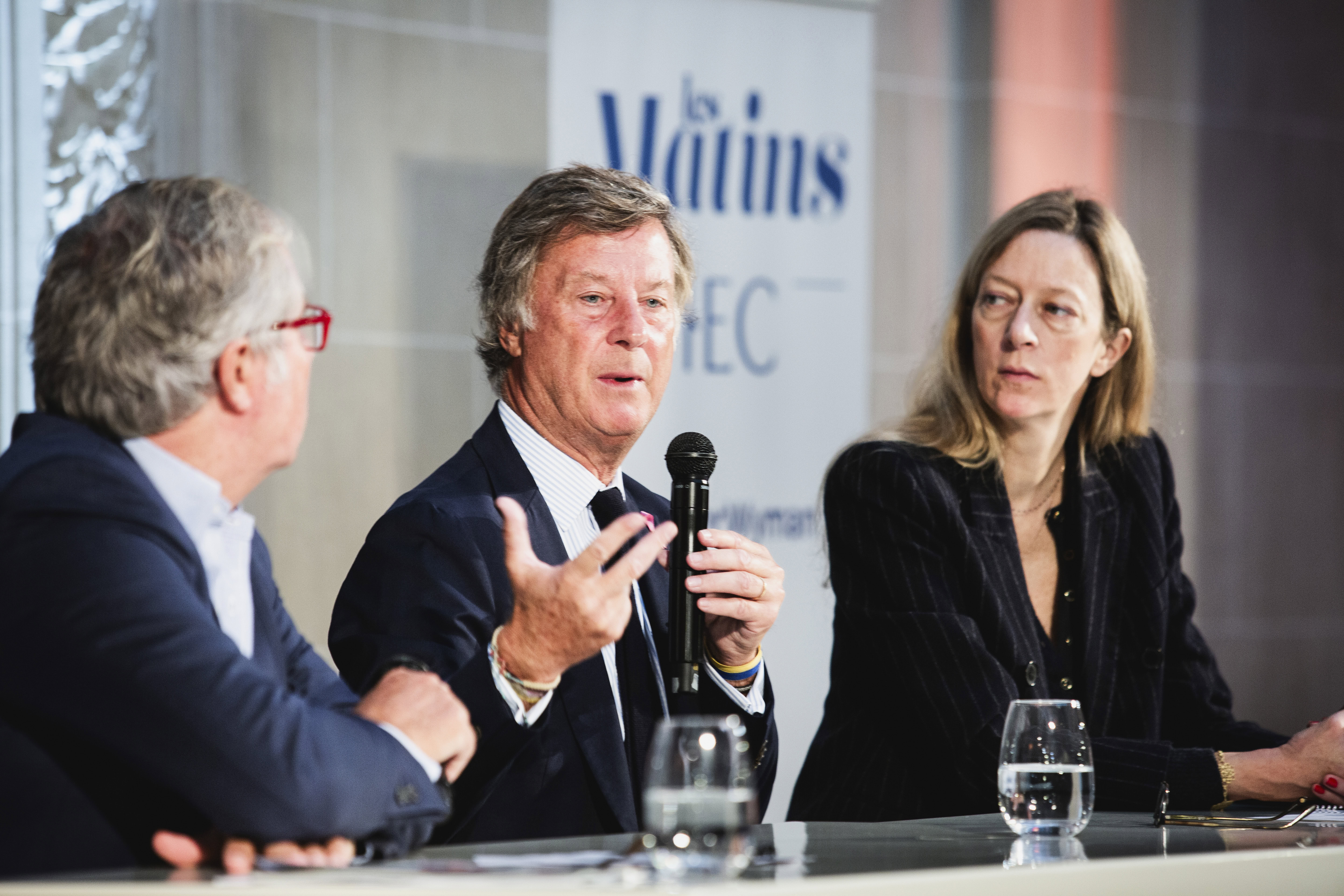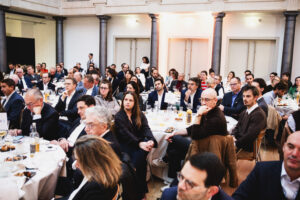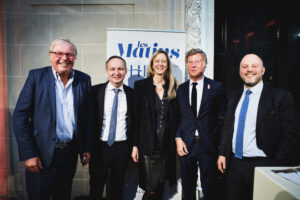Sébastien Bazin, an Eternal Optimist at Les Matins HEC

It was in a packed room at the Hôtel d’Evreux, Place Vendôme, that the 345th edition of Les Matins HEC took place. At the microphone stood a French leader with a distinctive personality: Sébastien Bazin, CEO of the hotel giant Accor.
Nicknamed “the man who knows how to make stones shine” by Le Journal des Finances back in 2007, Bazin was introduced at the breakfast by Hortense de Roux (H.05), President of HEC Alumni. His career path is anything but ordinary: a pure financier turned industrial leader. From Colony Capital where he oversaw the fund’s major European operations to Accor, which he took over in 2013. He went from managing a 30-person fund to leading a colossal organization of 330,000 people working under the group’s various brands.
When he arrived, the group was still very Franco-European and focused on budget hotels. “In twelve years, you’ve turned it into a global, premium company with over 5,700 hotels in 110 countries. More than half of its revenue now comes from outside Europe,” noted Hortense de Roux. She also mentioned the “showman” who famously jumped fully clothed into the Molitor Hotel pool at its inauguration in 2014.
When Bazin took the helm at Accor, 41% of the hotels were still owned by the company. In less than a decade, he radically transformed the model by adopting an “asset-light” strategy: selling the properties to focus on operations and branding. That 41% ratio has dropped to just 3%. “The real estate value of our hotels is €180 billion. Imagine if we owned it all. I’d spend my days managing property. But growth isn’t found on the balance sheet,” he explained. The reorganization proved monumental: he had to untangle a “plate of noodles” of contracts. But it allowed Accor to recover over €7 billion including €4 billion in cash and gave the group newfound agility… just before the Covid crisis. Perfect timing.
Under his leadership, Accor expanded from 12 to 45 brands, reinventing itself as a global player in luxury and lifestyle hospitality. Legacy brands like Ibis and Mercure remain the solid foundation of the group: “I spend nearly half my time on them, and they generate the cash that lets me take risks,” he said. But new acquisitions have opened the door to unique experiences: Raffles, Fairmont, Mama Shelter, 25hours… The upmarket shift is striking: nearly 50% of revenue now comes from luxury and lifestyle, compared to barely 10% ten years ago.
“Today, every brand wants to move from product to experience,” he notes — which makes Orient Express a truly unique venture. “It’s my baby, a sublime brand that speaks to everyone’s imagination. If you close your eyes and I say Orient Express, each of you will picture something different: the carriages, the gilding, Venice, Agatha Christie…” Accor is reviving the legendary 1908 train and preparing a cruise aboard the world’s largest sailing ship. When the pandemic hit, Accor lost 100% of its revenue in a single week. The CEO was determined to stay connected with his teams. “I told myself: I have time, let’s rethink our organization,” he recalls. Every two weeks, he recorded a video message for all employees, embracing full transparency. Each message ended with an “I love you.” The bet on resilience paid off: Accor’s revenue now exceeds pre-Covid levels, and the group is opening one new hotel per day worldwide, mainly in emerging markets.
The 60-year-old executive, who spends 260 days a year traveling (to the point of becoming a time-zone pro), also shared a clear-eyed view on technological disruption. “Ten years ago, the pirates were already inside our walls: TripAdvisor, Booking… then Airbnb. And now, artificial intelligence.” Accor struck back by building a global loyalty program, ALL – Accor Live Limitless, now boasting 120 million members. These loyal customers “spend 50% more and visit twice as often,” he says. And on AI? “It will profoundly change the way we operate, but I remain convinced that nothing will ever replace the emotion of human contact.”
That’s far from the only reason, he insists in true showman style, that the tourism and travel industry is “blessed by the gods.” “It represents 10% of the global economy, 11% of all jobs, and a quarter of the jobs to be created in the future.”

Matin HEC with Sébastien Bazin, CEO AccorHotels. crédit photo : Stéphane Lagoutte / Challenges
He also dares to be optimistic when Vincent Beaufils (H.75), Editorial Director of Challenges, questions him about the political climate. “France needs growth and stability — and right now, it’s lacking both. But it’s a rich, beautiful, and talented country. The current crisis is far from insurmountable! Instability isn’t a threat; it’s an opportunity to change our habits.” His group, in any case, can rely on its geographical diversification, which makes it resilient. “We’ve just had six incredible months in southern Europe,” he illustrates.
When asked about the hospitality professions, he highlights their demanding nature. “There are only three places open 24 hours a day: hospitals, police stations, and hotels. Hospitality is an all-consuming business.” Since the pandemic, many former employees have returned to the industry, drawn back by its human interactions. The CEO is also aware of the negative externalities of his operations in emerging markets. “When I open a hotel, I consume water and electricity. That negative column must be offset by a positive one — jobs, training, local impact.”
At 63, Sébastien Bazin says he wants to “finish the job”: to complete the 2023–2027 strategic plan and make Accor the leading hotel operator in India. The board of directors has renewed its confidence in him through 2028. During the audience Q&A, someone asks him how to balance short-term and long-term thinking. He quotes scientist and futurist Joël de Rosnay, who advised him to cultivate “broad time” — “the time spent reading, meeting people, exploring. Those moments when you’re not checking your watch. That’s when you gain perspective.” His lively and humorous words were a powerful reminder that, in hospitality, human warmth remains the most precious value of all.

From left to right : Vincent Beaufils (Challenges), Bruno Despujol (Olivier Wyman), Hortense de Roux (President of HEC Alumni Association ), Sébastien Bazin, Jean-Emmanuel Rodocanachi (Group Grandir) crédit photo : Stéphane Lagoutte /Challenges
Published by Thomas Lestavel

